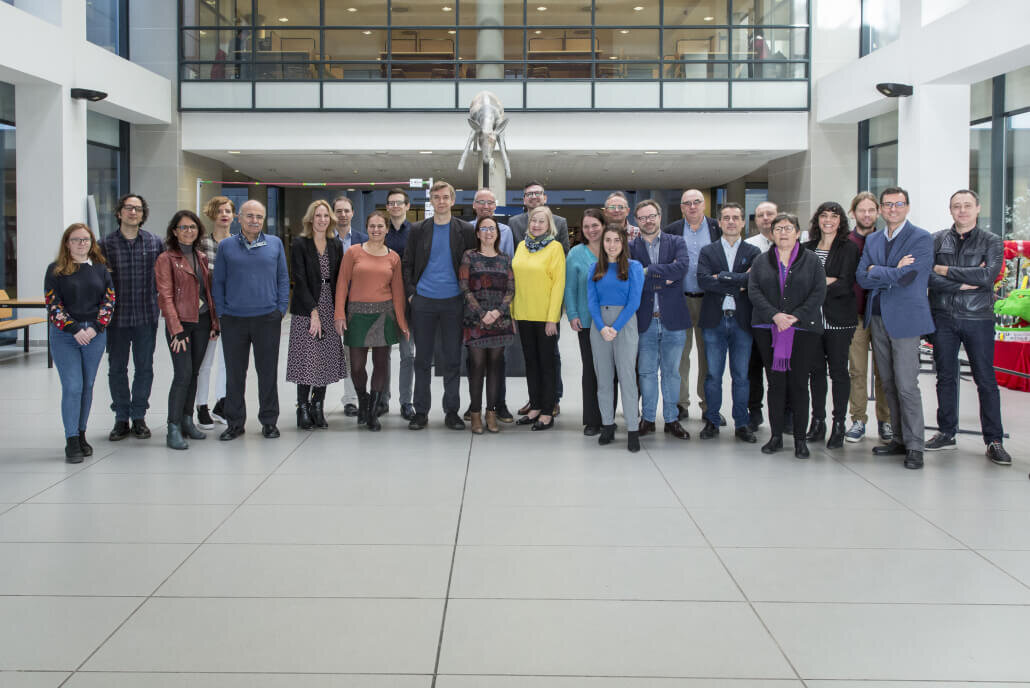Since January 2020, Universitat Jaume I (Spain), has coordinated the European ETHNA System project for the development and implementation of an ethical governance system that promotes responsible research and innovation.
A new initiative of the European Union seeks to bring ethics in research and innovation from theory to practice. The project called the ETHNA System aims to develop and implement a system of ethical governance to promote good practices in responsible research and innovation (RRI) in higher education institutions, research centers, and research funding institutions.
This is a research project of the Horizon 2020 Program, coordinated by Universitat Jaume I (UJI) that began in January 2020 and will end in December 2022. Ten partners in eight countries are participating. The partners include two universities, two research funding centers, and two technology parks in Spain, Denmark, Germany, Norway, Estonia, Bulgaria, Austria, and Portugal.
The research group on Practical Ethics and Democracy at UJI leads this project. In collaboration with other research groups, it will contribute expertise to implement institutional changes from an ethical perspective in the research and innovation structures of the European Union through fundamental pillars such as ethics and integration of research, gender equality, open science, and citizen engagement. Also, the Law, Management, and Effective Equality of Women and Men group at the same university will contribute to the generation of indicators for the different dimensions of RRI, under the coordination of Professor Santiago García Campá.
“Our goal is to bring ethics out of theory into practice,” said project manager Elsa González-Esteban, a professor in the Department of Philosophy and Sociology at UJI. For her part, the Rector of Universitat Jaume I, Eva Alcón, noted the importance of the role of the humanities in the transfer of knowledge. “Three years of hard work lie ahead, but also the challenge of raising awareness of the importance of Human and Social Sciences in research and the transfer of knowledge to society,” she said.
Science with and for society
For the next few years, the European Union (EU) plans to involve society in science and research. That is why the motto “Science and Society” has evolved into “Science with and for Society.”
However, while progress in increasing citizen participation has already been made, there is still a long way to go concerning governance. “Progress has been made in the area of gender equality and citizen participation, but governance is more complex because it requires structures, resources, and defined objectives. Often, we have organizations that declare their adherence to RRI, but they do not have an ethical infrastructure to support it,” explains González-Esteban. In this regard, the project manager stresses that “the human and social sciences can be very fertile when deciding and guiding how our institutions can follow and achieve this goal.”
Taking this challenge forward, the ETHNA System will produce transformations not only in the short term but also in the medium and long terms. “Having structures within our research and innovation that clearly define the path we want to follow and that can measure whether we are doing well or not is very important,” said the project director.
The European Vision of Responsible Research and Innovation
The debate on what it means to do “responsible research and innovation” emerged at the European level beginning in 2011. Responsible Research and Innovation (RRI) is an emerging concept that proposes developing science and technology with more transparent, participatory, and reflective processes. It also requires the co-responsibility of the various social stakeholders to decide where research and innovation are headed.
The goal is for these stakeholders (researchers, citizens, politicians, businesses, organizations, etc.) to work together throughout the entire research and innovation process to align it with the values, needs, and expectations of society. To achieve this, leaders of RRI anticipate and assess the potential implications and societal expectations toward research and innovation. This promotes the design of inclusive and sustainable research and innovation.
“Our goal is to bring ethics out of theory into practice.”
In practice, RRI is implemented through a process of public participation with multiple actors in research and innovation, allowing easier access to scientific outcomes and drawing society closer to the teaching of science. To achieve this, the European Union has established a political agenda around RRI that includes the following areas:
-
Ethics: to ensure the ethical integrity of research and its acceptability.
-
Governance: to provide tools that facilitate shared responsibility in R&D.
-
Participation: to promote collaborative R&D processes among multiple stakeholders.
-
Gender equality: to integrate the perspective of gender into research.
-
Scientific education: to increase the scientific knowledge of citizens.
-
Open access: to guarantee access to scientific knowledge and ensure transparency.
Of these areas, governance and ethics are the two most significant variables for RRI. However, they have the least research and implementation. Hence this initiative was born. “While responsible research and innovation have progressed from a training perspective, we do not have the same development in innovative governance structures, and this is where we bring our added value. We will consider all the dimensions of RRI. However, the objective is not to train in these dimensions but to generate a structure in the institutions that finance and conduct research to manage these dimensions ethically,” explains Elsa González-Esteban.
The work sections of the ETHNA System
The ETHNA System project is divided into eight work sections: management, internal coordination and communication, state of the art and benchmarking, assessment of project needs, design of implementation plans, implementation of the ETHNA System, evaluation and feedback, communication and dissemination, and ethical compliance.
“One of the biggest challenges is raising awareness of the importance of Human and Social Sciences in research and knowledge transfer.”
Universitat Jaume I will guide the project in all its phases and take care of the ethical compliance package and internal communication. The Norwegian University of Science and Technology will conduct a state-of-the-art review on the institutionalization of the structures of ethical research governance to learn about best practices developed in Europe. The Danish Board of Technology Foundation will coordinate the system’s implementation. The assessment and validation of the system will be carried out by the Communications and Applied Research Fund of Bulgaria.
A communication and outreach campaign will also be developed for the scientific community and the general public. And finally, a manual will be designed to serve as a compass for possible implementations of the ETHNA System by entities that want to replicate this process.
The role of ethics in science and innovation
It is essential that, as citizens, we engage and reflect on the role that research and innovation play in our daily lives. This requires accessibility and transparency around investments in science and innovation; these must align with the problems and needs of society. According to European Union documentation, “ethics” is understood as a way to ensure the “relevance” and “acceptability” of the results of research and innovation. Ethics align research and innovation with social well-being, job growth, and social cohesion, and it helps avoid wrong turns in research and innovation investments.
Given this importance, it is necessary to develop and extend a system of ethical governance for RRI in universities and higher education institutions and funding and research centers. This way, the required tools are available for decision-making and achieving responsible research and innovation from a critical and ethical perspective.
Translation by Daniel Wetta.
This article from Observatory of the Institute for the Future of Education may be shared under the terms of the license CC BY-NC-SA 4.0 
)
)


)